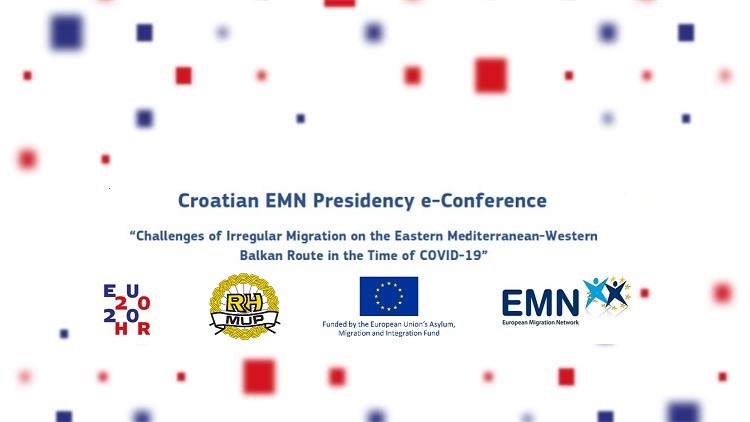- Published: 26.06.2020.
Challenges of Irregular Migration on the Eastern Mediterranean – Western Balkan Route in the time of COVID-19 main theme of EMN NCP HR Conference
European Agency for Fundamental Rights presented for the first time the “Border control at external land borders and fundamental rights”-practical guidance.
Under the Croatian Presidency of the Council of the European Union, the Croatian Contact Point of the European Migration Network (EMN) held on 24 June 2020 an e-conference on Challenges of Irregular Migration on the Eastern Mediterranean – Western Balkan Route in the time of COVID-19.With the participation of Mr. Ničeno, Head of the Border Police Directorate from Croatian Ministry of the Interior and Mr. Luchner, Director of the Strategy and General Affairs Directorate, European Commission as keynote speakers and distinguished speakers from European institutions, international organizations, police services and renowned universities, the conference gave an opportunity to discuss the challenges of irregular migration and the fight against migrant smuggling, taking into consideration the extraordinary circumstances of the COVID-19 pandemic. In addition, the European Agency for Fundamental Rights presented for the first time the “Border control at external land borders and fundamental rights”-practical guidance.
Emphasis was placed on the fight against migrant smuggling with reference to the situation of irregular migration on Eastern Mediterranean and Western Balkans route as well as the humanitarian dimension of the COVID-19 impact on irregular migration. Moreover, the obligation to respect human rights in migration management was in the core of discussions mentioning the recent judgments of the European Court of Human Rights (ECHR) and the Court of Justice of the European Union (CJEU), as well as presenting practical guidelines for the implementation of state border control, while respecting fundamental rights.
During the conference, it was emphasized that the COVID-19 pandemic significantly affected not only irregular migration flows and smuggling of migrants but also other migration fields across the European continent. The immediate actions taken by the Commission and Member states in this regard were highlighted, especially the provision of assistance to third countries, including the Western Balkan partners. One of the most important key messages was that migration will not disappear in the future and will continue to be present and will, therefore, remain a top priority in the EU agenda. We should strive to achieve migration management that is sustainable and predictable while respecting fundamental rights and core values on which the European Union is founded. Cooperation between the Member States, but also with third countries, especially our Western Balkan partners should be continued and enhanced.
To protect fundamental rights, national legal systems must fully incorporate the requirements and safeguards deriving from EU law, the ECHR, as well as international human rights and refugee law. The conference also fostered discussion on recent judgments of the ECHR and the CJEU and provided an opportunity for the European Union Agency for Fundamental Rights to officially present a practical guidance for border-management staff in European Union Member States who work at the operational level. It aims to support them in the implementation of the fundamental rights safeguards of the Schengen Borders Code (Regulation (EU) No. 2016/399) and related EU law instruments in their daily work when carrying out controls at external land borders.
More information about the event can be found here.
Contact:
European Commission – EMN
Mr. Magnus Ovilius
Head of Agencies and Networks coordination Sector and EMN Chair
Email: magnus.ovilius@ec.europa.eu
EMN Croatia
Mrs. Lidija Pentavec
National EMN coordinator
Email: emn@mup.hr
